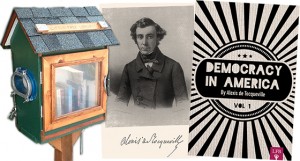In the classic Democracy in America, Alexis de Tocqueville expressed astonishment at Americans’ proclivity to form associations to get things done. Causes from parks to roads to clean-up to libraries . . . Americans were organized. Indeed, they organized themselves. Whereas in Europe the common folk would wait for a magistrate to start the job, in youthful democratic America, the people did the work.
Usually outside of government.
Regrettably, the glory of America’s early days may be past, but the spirit lingers.
One of my favorite examples of lingering can-do neighborliness is the “Little Free Library” movement.
Haven’t heard of it? It is the practice by which just plain folks share their books. Not on the Internet at Goodreads or LibraryThing or what-have-you, but on their own property, street side. The examples I’ve seen have an utterly charming public face: little birdhouse-sized free lending libraries, with roofs made of roofing material, and a door with glass panes, allowing passers-by to see what’s inside.
And what’s inside? Books.
Usually, the little “libraries” encourage folks to take a book, bring a book.
Sometimes they advise readers to just take.
It’s the spirit of the public library, only provided privately, and without great pretense. Or expense.
I wrote about this charming new tradition on my Common Sense site this week, and I featured a photo of one example, from the Pacific Northwest in the tiny burg of Cathlamet, Washington. On its roof it proudly emblazons what it is: “Little Free Library.” The sponsor and rules are embossed on a plate on one side, above a maritime window/port. And behind the glass door — about a dozen books, many of them hardcover, with dust jackets intact.
Admittedly, many other “Little Free Libraries” are far less well constructed, but the idea is the same: place up front, by a road or sidewalk, a presentation box for book exchanges.
It is obvious: libraries like this are both quaint and useful — encouraging literacy, the activity of reading, and the appreciation of learning. Mainly, what these private library stations are is an example of neighborliness.
And yet, governments across the country are cracking down.
Not the federal government, thankfully enough, but city governments. To which you can more easily complain, and be heard, and have an effect.
In Lincoln, Nebraska, a neighborhood association placed one on a church lawn. The city lashed back, demanding removal or face a $500 fine.
The city of Shreveport, Louisiana, went after one of its local Little Free Libraries, and offered the “librarians” the option of appealing its cease-and-desist letter — for $500. Neighbors rallied around the little libraries, though, with new Little Free Libraries popping up. An artist, who joined the book sharing effort in solidarity, told reporters that the local planning board should “sod off.”
A 9-year-old in Leawood, Kansas, made a Little Free Library for his mother, as a Mother’s Day present. The city threatened multiple citations, and made unreasonable demands, and . . . received a huge backlash.
Writer Peter Cook and his wife, in L.A., had put up a Little Free Library, upon which they found an anonymous note from a neighbor, proclaiming hatred for them and their kids, demanding that they take their library down — “or the city will.”
The city sided with the anonymous hater. But then explored possibilities of permits and an arts subsidy!
I regard these tales as instances not of rampant, uncivilized property owners committing nuisances and obtrusive assaults on civilization justly curbed by the responsible forces of law and order, but, instead, as prime examples of how meddlesome, ugly, intrusive, and anti-social governments can be. Even, or perhaps especially, local governments.
What the outcome of these stories will be, ultimately — or of the Little Free Library movement in general — depends on Americans’ tolerance for the nastiness of grievance-prone, prickly, unneighborly neighbors, and, more to the point, for busybody government at the local level.
Paul Jacob, October 4, 2015
This column first appeared at Townhall.com.
